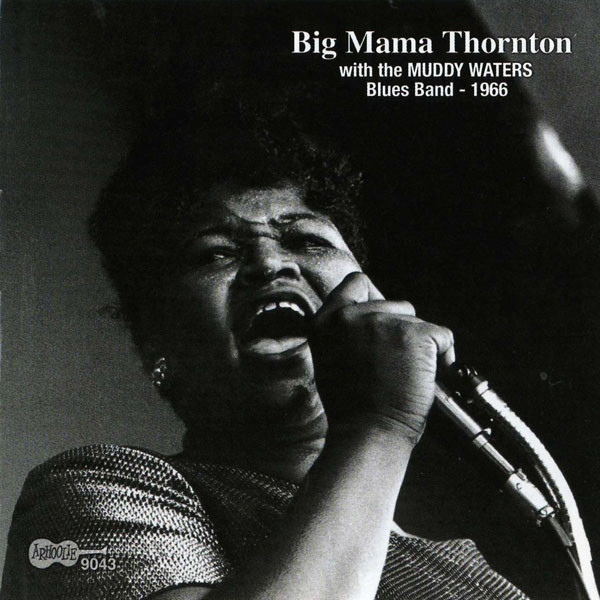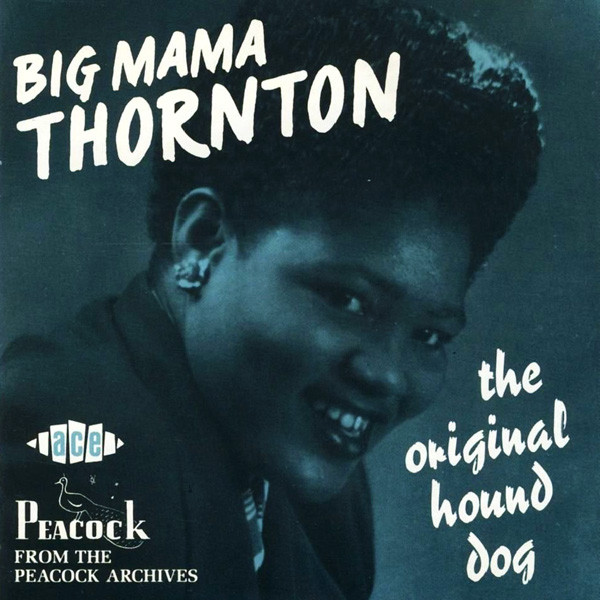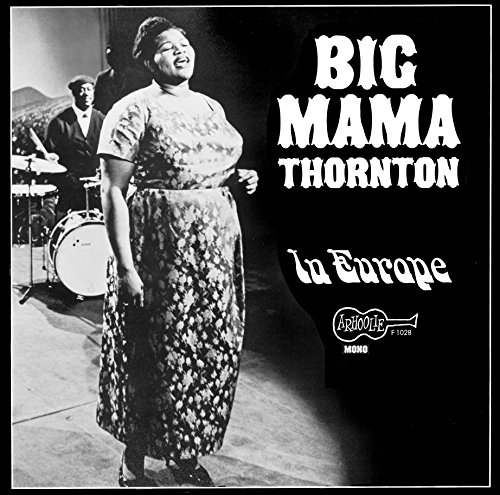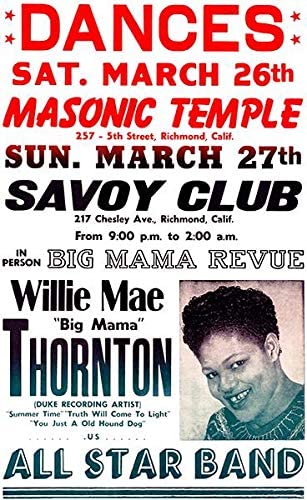
BIG MAMA THORNTON December 11, 1926 – July 25, 1984
RECOMMENDED ALBUMS: BIG MAMA THORNTON IN EURPOE (Arhoolie), BIG MAMA THORNTON AND THE MUDDY WATERS BLUES BAND (Arhoolie), THE ORIGINAL HOUND DOG (Ace Records)





RECOMMENDED ALBUMS: BIG MAMA THORNTON IN EURPOE (Arhoolie), BIG MAMA THORNTON AND THE MUDDY WATERS BLUES BAND (Arhoolie), THE ORIGINAL HOUND DOG (Ace Records)



Born in Arkansas in 1915 Sister Rosetta Tharpe influenced Rock and Popular music more then most people know. A young Little Richard got his start by opening for her before anybody knew who he was. Elvis, Johnny Cash, and Bob Dylan all cite Sister Rosetta as a major influence, and during her heyday she performed for stadium sized crowds all over the world. In short, Sister Rosetta was a rockstar before Rock n’ Roll even existed.
Mavis Staples is a living legend. Over the past 60 years she’s not only brought Gospel music to the masses but she’s also been a voice of hope and strength for those fighting for Civil Rights. Her career started in Chicago during the late 1940’s when she and her siblings would perform in churches alongside their father, the legendary Roebuck “Pops†Staples. With a sound that was rooted in Southern Gospel and Delta Blues “The Staple Singers†soon became local favorites and in the early 50′s began recording sides for labels like VeeJay, Riverside, and Checker. In addition to gospel music fans the band was also embraced by the folk music scene during the folk revival of late 50′s and early 60′s. It was during this time that the band became very active in the civil rights movement and regularly performed at rallies and events hosted by Dr. Martin Luther King.
In the late 60′s and early 70′s the music scene was changing and the band changed right along with it. They signed with the legendary STAX Records and under the guidance of STAX A&R man Al Bell they started adopting more of a Soul-Gospel style. Their music might have become a little funkier but it still contained the same message of hope, love and compassion. Songs like “Respect Yourself“, and “I’ll Take You There†made the band a household name and catapulted them into stardom. Unfortunately, due to some questionable business decisions by Al Bell STAX Records filed for bankruptcy in 1975 and was forced to shutdown.
The Staples pressed on and over the next several years put out several releases for a variety of different labels. While they had success with their 1975 album LET’S DO IT AGAIN the group mostly was out of the spotlight until the 1990’s. During the 2000’s Mavis continued to perform and release solo albums. Paired with producers such as Ry Cooder and Wilco’s Jeff Tweedy, these records introduced Mavis to a whole new audience. In 2013 her Jeff Tweedy-produced album You Are Not Alone won a Grammy for “Best Americana Album”.
This year Mavis will turn 75 years young and she’s just as popular as ever. People all over the world still cram into venues to see her perform and she’s a regular musical guest on late-nite TV. Her music still carries with it a message of hope and tolerance. A message that reminds us that even though there have been victories in the struggle for civil rights, the fight is far from over.
STAPLE SINGERS/MAVIS STAPLES SUGGESTED LISTENING
The Staple Singers: Uncloudy Day (VeeJay)
The Staple Singers: Freedom Highway (Epic/Legacy)
The Staple Singers: Be Attitude: Respect Yourself (Stax)
The Staple Singers: The Staple Swingers (Stax)
The Staple Singers: The Best of The Staple Singers (Stax)
Mavis Staples: We’ll Never Turn Back (Anti) produced by Ry Cooder
Mavis Staples: You Are Not Alone (Anti) produced by Jeff Tweedy
Mavis Staples: One True Vine (Anti) produced by Jeff Tweedy
LEE FIELDS & THE EXPRESSIONS EMMA JEAN Truth & Soul Records
For Fans of: Issac Hayes, James Brown, Solomon Burke, and Charles Bradley
This summer Lee Fields & The Expressions are back on the scene with a new record full of sweet soul music! Entitled Emma Jean in honor of Lee’s late mother, this record finds the band incorporating more elements of Folk and Gospel into their sound more then they have in the past. In fact, the album’s first single is a soulful version of the J.J. Cale tune “Magnolia”. Sounding a little like Solomon Burke, Lee croons his way through this Folk classic with help from pedal-steel guitar master Russ Pahl. While the song is stylistically a little different then songs Lee and his band have done in the past, they still sound great. That being said, Emma Jean has something for everyone. Fans of classic hard-soul will enjoy songs like “In the Woods” and “Stone Angel” while fans of the teary-eyed ballads will have a new favorite song in “Don’t Leave Me This Way”. The album’s standout track however is the piano-driven “Eye to Eye”. In this song the band sways back and forth while Lee pleads with his lover to take him back. Singing like his life depends on it, Lee is clearly still at the top of his game. For a guy who’s been releasing music since 1969, this album might be his crowning achievement.
FEVER: Little Willie John’s Fast Life, Mysterious Death, and the Birth of SoulÂ
Author: Susan Whitall Publisher: Titan Books
Armed with a lion-like voice and sparkling personality Little Willie John was one of the most popular entertainers during the 1950’s and 60’s. Songs like “All Around The World”, “Fever”, and “Talk To Me” all made it to the top of the R&B charts and became the blueprint for what would later be called “Soul Music”. He consistently filled concert halls throughout his career always delivering an electric stage show that left audiences wanting more. On the road more often then not Willie lived his life fast and hard. He regularly stayed out until the wee-hours of the morning drinking and socializing. One night after a show in Seattle, Washington while he was drinking at an after-hours club Willie was involved in an altercation that ended with him stabbing a man. Willie ended up being charged with manslaughter and was sent away to the Washington State Penitentiary where he died on May 26 1968 at the age of 30. Although the cause of his death is listed as “Heart Attack”, there are questions about the care he was given while incarcerated. However it happened, it’s a sad but true fact that Little Willie John left this world too soon.
In her book FEVER: Little Willie John, A Fast Life, Mysterious Death, and the Birth of Soul, author Susan Whitall gives us a detailed and in-dept look at the life of one of music’s greatest voices. Written with the help of Willie John’s son Kevin and filled with interviews from those who knew Willie John this book is essential for anyone interested in the history of Soul music.
Essential listening Little Willie John: Complete Hit Single’s A’s & B’s
RESPECT YOURSELF: THE STORY OF STAX RECORDS Bloomsbury USA
Author Robert Gordon has been writing about the music of Memphis for almost 30 years. In Respect Yourself: The Story of STAX Records Mr. Gordon not only tells the story of STAX but also the story of the Civil Rights movement in Memphis.  Passionately written and meticulously researched this book takes you from the label’s meager beginnings in a garage outside Memphis to it’s bankruptcy in 1975.  Along with Mr. Gordon’s narration you hear from the people that made STAX happen, making this book one of a kind.
A LITTLE STAX HISTORY…
Started by Jim Stewart and his sister Estelle Axton in 1957, STAX Records was more then just a record label. It was a voice in the community. The label’s open door policy made it possible for anyone to come in off the street and set up an audition. It didn’t matter where you were from or what the color of your skin was, you were welcomed at STAX as long as you had a passion for music.
Right from the beginning STAX did things it’s own way. Segregation may have been alive and well in Memphis during the 1960’s, but that didn’t stop STAX founder Jim Stewart from hiring an African American DJ named Al Bell to be his lead promotions man. Â Working together side by side Jim, Estelle, and Al turned STAX records from a little indie label into a household name! Â STAX artists like Otis Redding, Booker T. & The MG’s, Carla Thomas, and William Bell put the label on the map with singles that started appearing on the R&B and Pop charts. Â Money was coming in and things were really rolling, until one very dark December day in 1967…
Today many people can remember exactly where they were when they learned that the plane carrying Otis Redding and The Bar-Keys went down. Otis was the soul of STAX and the voice of soul music. Â A few months later while the people of STAX were still grieving over the loss of Otis and the Bar Keys their world was rocked again. Â On the evening of April 4, 1968 Â Dr. Martin Luther King was assassinated at the Lorraine Motel in Memphis. Â Needless to say, after the assassination of Dr. King everything was different, especially in Memphis. Â If all this wasn’t enough, Â the label’s distributor Atlantic Records ended it’s relationship with STAX. Â With it’s biggest star gone and no way to get music to the stores most label’s would have called it a day, but most labels didn’t have Al Bell. Â It was then that Al and the folks at STAX hunkered down and staged one of the biggest comebacks in music history.
The early 70’s found STAX again at the top of the Soul music world. This time around STAX would reach heights that were even greater then it did in the 1960’s. Al Bell gained full control of the label and STAX rode the success of artists like Isaac Hayes, The Emotions, Johnnie Taylor, and The Staple Singers all the way to the top of the charts. Sadly this rebirth would be short lived as some questionable business decisions and over expatiation lead to STAX eventually having to declaring bankruptcy in 1975.
All that said, STAX has lived on in many different ways. Many of their artists are still celebrated today and have found new audiences. Artists such as William Bell, Mavis Staples, and Eddie Floyd still perform and continue to release new music while others like Sam Moore are mostly retired but still appear at the occasional music festival. The studio was rebuilt and is now a museum (possibly the best museum in Memphis not named The National Civil Rights museum). There is also the Stax Music Academy, a music school that is focused on providing music education to local youth. So while the days of Otis roaming the halls and Al Bell running the office might be gone all is not lost. The future of Stax is very bright.
Funk and Soul music has always been a large part of my music collection. My first exposure to Funk, Jazz, and Soul came through my High School band director Dr. Van Decker. While most other school bands in the area did the marching band thing we played music by Herbie Hancock, James Brown, and Thelonious Monk.  Inspired by the music we learned about in class, I would often head to my local record store (Lou’s Record Shop in Encinitas, CA) after school and pick up albums so I could hear the original version of the song we were learning in class. At first listen most of the grooves on these original recordings sounded simple but when you paid attention you could hear all the little nuances that really made the tune move. While I’ve always preferred Funk to Jazz it was playing in my High School Jazz band that introduced me to Funk music. So, thank you Jazz. If it wasn’t for you I would’ve never discovered how funky this world could be.
Here are some of my favorites… Play ’em loud and enjoy!
SATURDAY NIGHT FISH FRY: NEW ORLEANS FUNK AND SOULÂ
Label: SOUL JAZZ RECORDS
This record from the good folks at SOUL JAZZ RECORDS is a great mix of funk, soul, and gospel from a group of artists that can only be described as New Orleans royalty. Besides tracks from popular artists like Dr. John, Lee Dorsey, and Irma Thomas this album contains some great b-sides from lesser know musicians like Eddie Bo, Eldridge Holmes, and Betty Harris. While these artists created some of the most soulful funk to ever come out of New Orleans they unfortunately never achieved stardom (at least on a level that they deserved) nationally. The stand out track for me on this record is “Pass The Hatchet” by Roger & The Gypsies. This tune was produced by famed New Orleans musician Eddie Bo, (who also sings lead on the track) and became the first hit for the indie Seven-B label. Listen up drummers, this song is a perfect example of how a simple drum beat and a little melody can go a long way. If I have one complaint about this release it’s that it is currently out of print and doesn’t seem to be on iTunes or Spotify as of this posting (although some of the tracks are available on other releases). I came across my copy a few years ago digging through the $1.99 used bin at a local record store. Let this be a lesson to ALWAYS check the bargain bin when shopping for records.
THE FUNKY 16 CORNERS
Label: STONES THROW RECORDS
Released in 2001 by Stones Throw Records, The Funky 16 Corners features a hefty helping of unreleased funky music recorded during the 60’s and 70’s.  All the tracks on this record are solid and the stories behind the music are just as moving as the music. If you purchase this release on-line I highly suggest you check out www.stonesthrow.com to read the interviews with the artists that were collected during the formation of this disc. For example, one of the groups featured on this disc is The Kashmere Stage band. This was the school band for Kashmere High School in Houston Texas. In the late 1960’s music director Conrad Johnson took the school’s struggling music program to a new level. After introducing new arrangements and letting the kids inject some of their own style in the group The Kashmere Stage band started winning numerous awards and competitions. They traveled all over the country breaking down barriers in many of the places they played (Kashmere H.S. was predominantly black and most of the school band competitions they entered were made up of all white groups). For more information on the story behind the Kashmere Stage Band check out the documentary film THUNDER SOUL.
Searching For Soul: Rare and Classic Soul, Funk, and Jazz from Michigan
Label: Luv N’ Haight/Ubiquity
The album Searching For Soul: Rare Classic Soul, Funk, and Jazz from Michigan shows us that there is so much more to the Mid-West Soul scene then Motown.  Soul/Funk/Hip-Hop drummers, this record should be in your collection right next to your James Brown records. From the lead track “Give & Take” to Wendell Harrison’s swinging’ “Take Time Out” this record will have you up and moving like you never knew you could. Additionally, it should also be mentioned that the track “Alcohol Pt.1” by Robert Jay is the perfect “morning after” song.
(UPDATE 2021) This record is out of print but you can still enjoy this music on-line on Spotify.